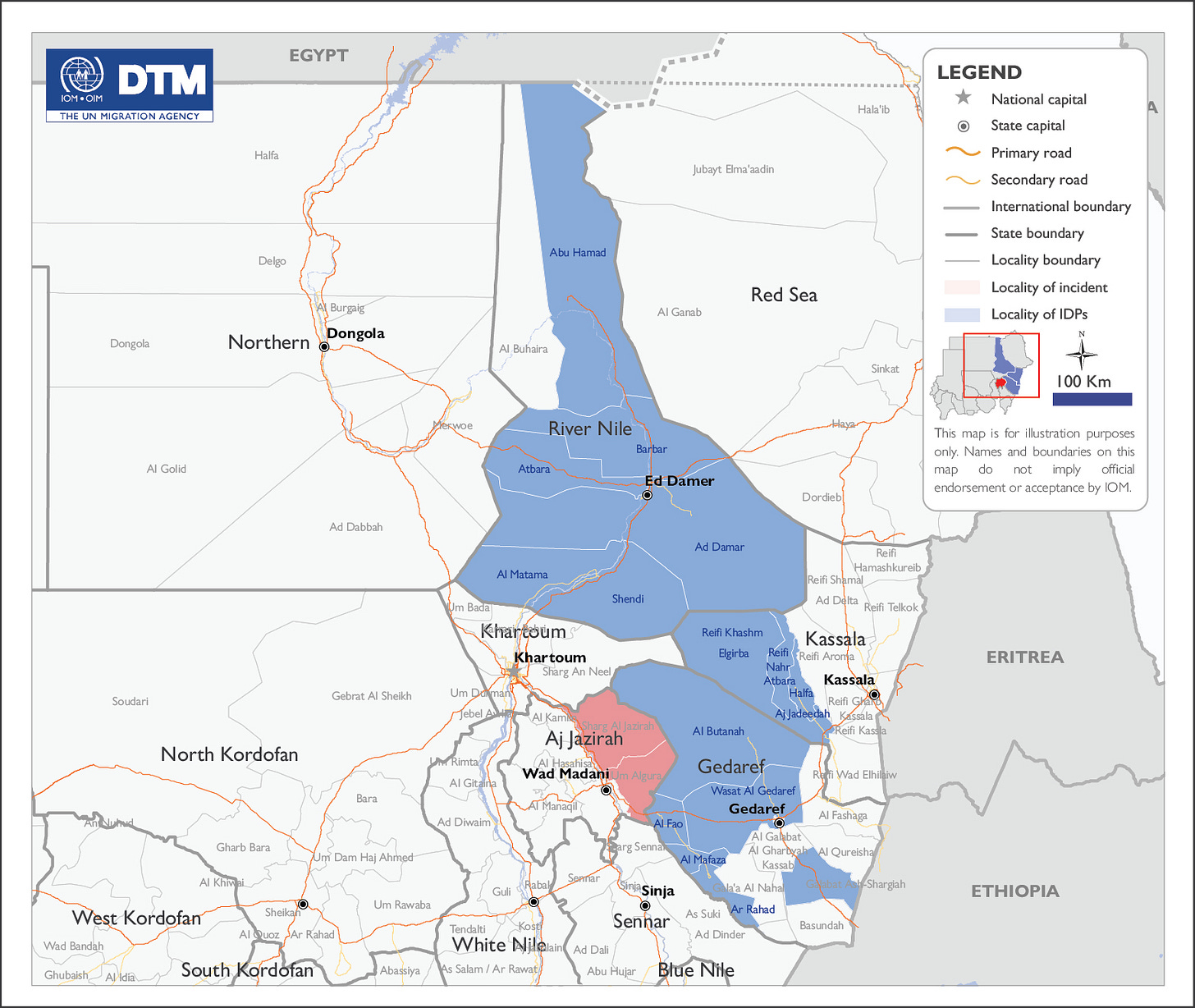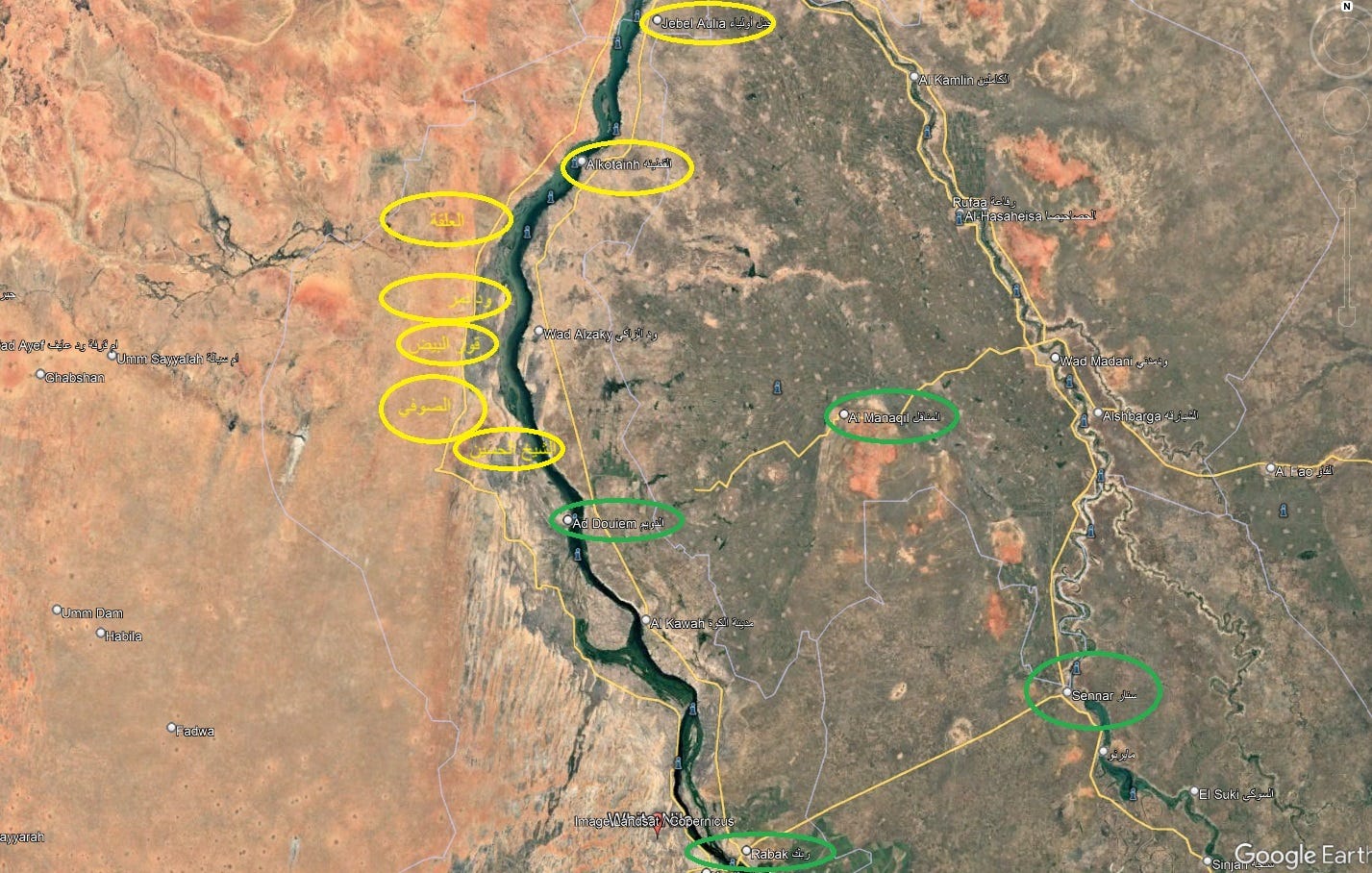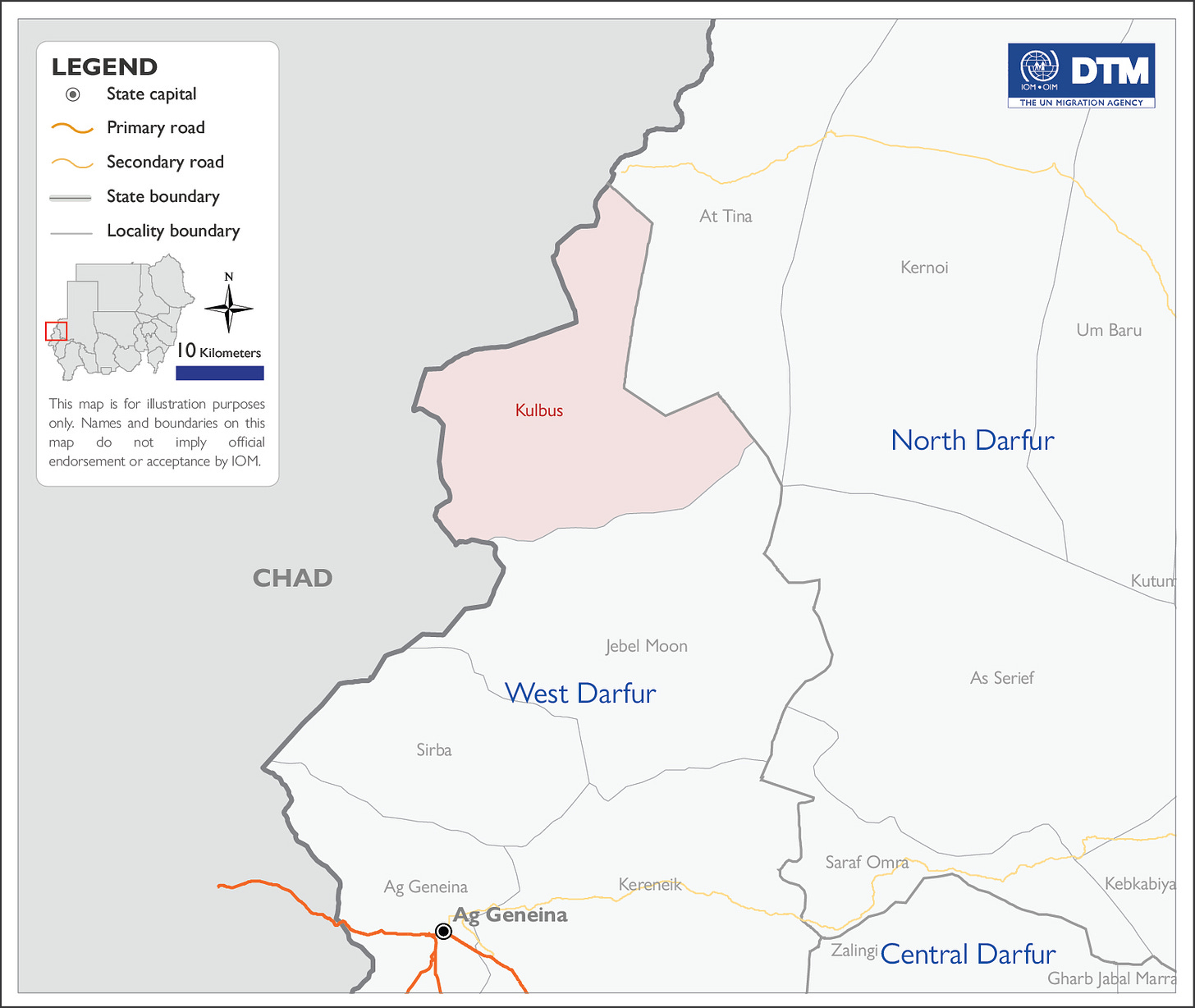Sudan army continues offensive following savage RSF reprisal attacks
Massive new wave of displacement from Jazira State
The Sudanese military (SAF) over the past few days launched ground operations and airstrikes in several theaters as it tried to sustain an offensive that began a month ago.
The momentum of the offensive seems to have stalled somewhat over the past week or so, following more rapid gains in late September and the first half of October.
In particular, the fighting in Khartoum is still limited mostly to a small bridgehead in the Mogran district, with little change in territorial control lately. (In the video above, SAF soldiers are seen crossing the Medical Crops bridge into this sector).
Elsewhere, however, SAF advanced along several axes, including in Suki in Sennar State last week, east of Managil this week, north of Sennar City, and inside El Fasher.
The latest fighting follows savage reprisal attacks by the Rapid Support Forces (RSF) against villagers last week in Al-Jazira State, which involved targeted and mass killings, mass arrests of male villagers, torture, burning of crops, and sexual violence.
These attacks against civilians coincided with SAF incursions into the state (map) and seemingly were intended to crush popular resistance to the RSF, whether real or perceived. In the town of Sariha alone, the RSF killed 124 people and wounded another 200, according to the Sudanese Doctors’ Union.
Heavy civilian casualties also were reported in the villages of Tamboul and Rufaa.
The defection of an RSF commander native to the state, Abu Aqla Keikel, played a role in triggering these attacks. In a statement, the spokesperson of the UN Human Commission in Geneva said,
“Since the defection of Abu Aqla Keikel, a commander in the Rapid Support Forces (RSF), to the Sudanese Armed Forces (SAF) on 20 October, attacks by the RSF on villages in Al-Jazirah state have increased, apparently in retaliation for his defection, and targeting members of his ethnic group…”
“In addition, there are concerning reports that the RSF detained and ill-treated civilians from the targeted villages, and confiscated internet devices and telephones in some 30 villages, cutting off vital channels of communication.”
Rather than deny these killings, RSF influencers on social media have tried to justify them by claiming that the villagers were plotting with the Sudanese army and receiving weapons from them. Although it is true that villagers in some parts of Al-Jazira State have received weapons from Sudanese Military Intelligence, there is little evidence that the latest killings were the result of armed clashes.
At least 119,000 people have fled from two localities in Jazira State (pictured on map) since October 20, according to the International Organization for Migration.
The RSF’s use of terror tactics in Jazira State resembles the tactics they previously have used in Darfur, according to Clementine Nkweta-Salami, United Nations Resident and Humanitarian Coordinator in Sudan. She said,
“I am shocked and deeply appalled that human rights violations of the kind witnessed in Darfur last year—such as rape, targeted attacks, sexual violence, and mass killings—are being repeated in Aj Jazirah State. These are atrocious crimes.”
Leading up to these massacres, the RSF’s control over Al-Jazira State appeared to be slipping. The army’s simultaneous offensives in Khartoum, Bahri, Sennar, and North Darfur had drawn away RSF troops to other fronts, leaving the state vulnerable.
For background, the Rapid Support Forces captured most of Al-Jazira State in December 2023 and most of neighboring Sennar State in June/July 2024. They still maintain military control over large parts of Al-Jazira State and parts of neighboring Sennar State. Administratively, however, the RSF never established effective control over the two states and had tense relations with the local residents.
Meanwhile, in other military developments:
The army and the Joint Force attacked the Rapid Support Forces in the southeast neighborhoods of Al-Fasher, capital of North Darfur, on Tuesday evening
The RSF shelled Abu Shouk Camp in El Fasher the same day, killing and wounding a number of civilians.
SAF troops based in Al-Managil on Sunday advanced east into Al-Mukheirif, a village southwest of the Jazira State capital Wad Madani.
Yesterday, a battalion of Central Reserve police arrived in Al-Managil to reinforce the frontline city. Simultaneously, a convoy of fuel trucks arrived in the city.
SAF warplanes bombed Jebel Aulia, Hajj Yusuf Market in Khartoum State, other parts of Khartoum City, and Al-Koma in North Darfur in recent days.
The death toll from an airstrike in the Sahreij area of Khartoum increased to 25 after a citizen died of his injuries, one of two brothers killed in the attack, according to the Southern Belt Emergency Room.
Mohamed Kandasha, spokesman of the Southern Belt Emergency Room, said the bombing was a war crime, adding, “During the month of October, the region lost more than 100 people of its citizens, among them women and children, through four airstrikes that targeted the areas of citizen gatherings, consecutively in Central Market Station, Alsalma Grocery, Sahreij Station, and 60th Street.”
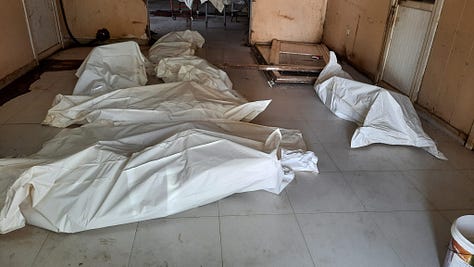
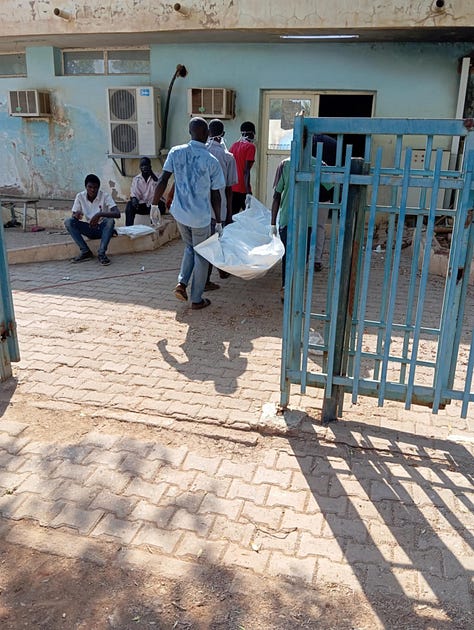
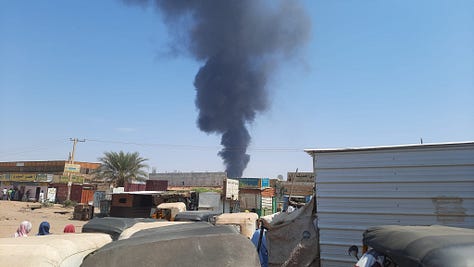
Hundreds of residents of Khartoum’s southernmost neighborhoods have died in airstrikes since least year. The airstrikes appear to be indiscriminate and based on ethnic prejudices about the area rather than targeting specific military targets. The Southern Belt, also called the “Black Belt,” refers to a zone of suburbs (formerly displacement camps) around Khartoum that historically housed many people who had fled from war zones in South Sudan and Darfur. As explained by researcher Ahmed Elzobier, writing soon after the Darfur genocide, the Black Belt was a place of “unchecked prejudices against people from Darfur and Kordofan,” whose residents were regarded by the Riverine Islamist elites of the Al-Bashir regime as “the enemy within.” The area is also home to many South Sudanese.
Soldiers in El Fasher are “distressed over inadequate wages,” according to Darfur 24. Although they have been paid through the Bankak app, a shortage of physical cash in the besieged city has made it hard for them to convert these electronic payments into usable currency. The publication cited reports of soldiers abandoning their posts or selling military supplies to support their families.
Fears of RSF attacks near Ad-Douiem
The Rapid Support Forces advanced along the western bank of the White Nile toward the city of Ad-Douiem, headquarters of the army’s 72nd Infantry Brigade and a center of mobilization and training for the army and the Popular Resistance.
Although no major clashes were reported, RSF troops attacked the village of Rijl Zaghawa on Monday, October 28, killing nine people, including a child, and they shot down a reconnaissance drone, according to reporting by Radio Dabanga.
Citing video evidence and local sources, Dabanga reported the presence of RSF forces in villages to the north of Ad-Douiem, though several outlying villages are still under SAF control. A bus driver who drives the route between Ad-Douiem and the village of Jebel al-Arshkol told Radio Dabanga that the RSF hadn’t yet arrived in the latter village, saying the area was calm. However, citizens who contacted Radio Dabanga from inside the city of Ad-Douiem did not hide their growing concern, especially after troops were seen leaving the city toward the north and west.
The RSF first arrived in White Nile State in October a year ago, shortly before the fall of Jebel Aulia, a city on the east bank, 40 km south of Khartoum. Since then, occasional fighting has taken place on the east bank, south of Jebel Aulia, resulting in a major rupture of an oil pipeline coming from South Sudan. However, the west bank has not seen much fighting, with few clashes and only a few airstrikes reported.
An attack on Ad-Douiem, or the villages nearby, could change that and would cause significant displacement toward the south or, possibly, toward Omdurman to the north.
The army-controlled areas are heavily militarized with many training camps throughout the area, as well as “Popular Resistance” forces (civilians armed by SAF).
Historically, Ad-Douiem played an important role in the development of Sudan’s educational system, ever since the British established a teacher training college in the area in 1934. It also became an important hub for the trade of crops and livestock, and a manufacturing center for cheese and vegetable oils.
News in Brief
The Financial Times published an investigation into the toll of Sudan’s war on the healthcare system, particularly hospitals in Omdurman, which are subject to shelling by the RSF. According to health authorities, 54 doctors have been killed in Khartoum State since the war began. About 70-80 percent of Sudan’s healthcare facilities are not operating at full capacity.
Security agents arrested the Sudanese journalist Abdelmajid Abdelhamid in Gedaref, despite his strong pro-army stance. This happened shortly after he wrote an article on Facebook about a procurement contact awarded by the Bank of Sudan for the printing of banknotes. (After the RSF took over Sudan’s mint in Khartoum last year, the central bank had no way of printing money).
According to the arrested journalist, the central bank of Sudan recently awarded a contract to print 1.2 billion bank notes to the Russian state-owned Goznak company, rather than a rival bidder, the American company Crane Currency, which made a better offer. Abdelmajid wrote that the U.S. company’s offer was lower by six million euros, adding, “The American company’s technical specifications are higher than the Russian company and the Russian company is under sanctions and this poses great risks to the [central] bank and the country.”
Amy Pope, the Director General of the UN Migration Agency (IOM), visited Port Sudan, where she met with IOM staff, the military leader of the country, the foreign minister and interior minister, and displaced people. She also visited Tokar (pictured) in Red Sea State, where a dam recently collapsed, devastating the area.
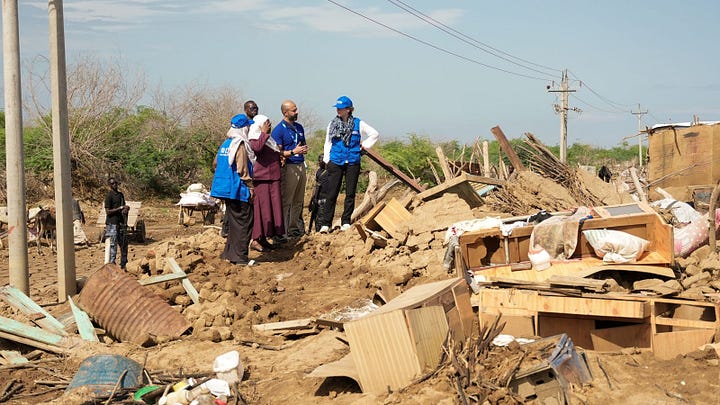
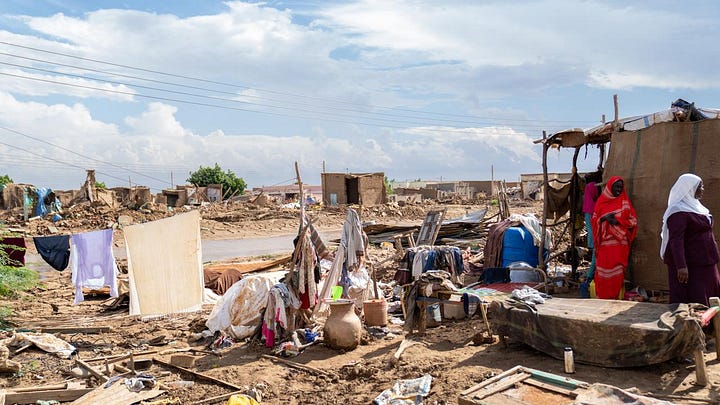
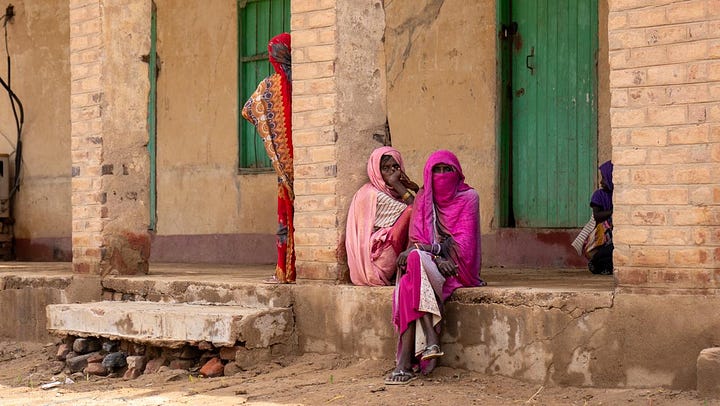
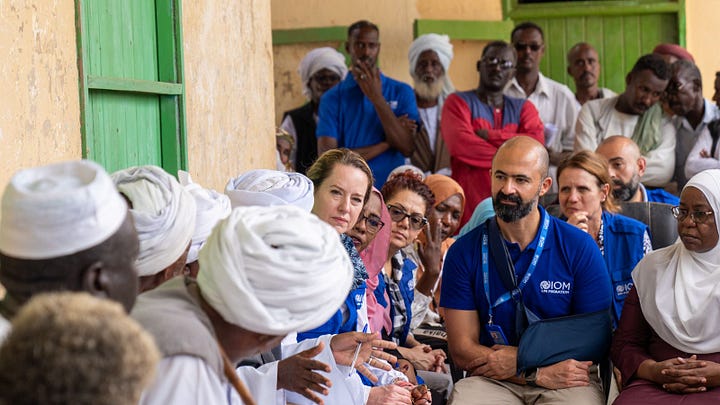
Yesterday a United Nations airplane arrived from South Sudan to Kadugli Airpot in South Kordofan, carrying a delegation to discuss the opening of a humanitarian route into the city. This follows international negotiations, as well as recent high-level political talks involving top Sudanese military leaders, South Sudan’s President Salva Kiir, and the SPLM-North, a rebel group that controls territory near Kadugli. Two weeks ago, the U.S.-led “ALPS” group of diplomats called for the creation of a deconfliction/notification mechanism to ensure the safety and security of aircraft and personnel involved in managing air operations to the city.
The Beja Nazir Sayed Tirik, who was an influential part of the former ruling party, the National Congress (NCP), in Kassala State, criticized the NCP leader Ibrahim Mahmoud Hamid, who recently returned to the country after a two-year exile in Türkiye. “If the National Congress is led by the man who came to Port Sudan a few days ago [Mahmoud], then it is worse than Hemeti [the commander of the Rapid Support Forces], who fought them and left them nothing.” Tirik’s remarks point to an ongoing leadership struggle within the resurgent Islamist movement.
Displacement from Darfur into Chad has accelerated over the past month, including approximately 10,000 households displaced from Kulbus Locality, where the RSF and former Darfur rebel groups (now allied with the army) have clashed repeatedly in a series of hit-and-run battles.


